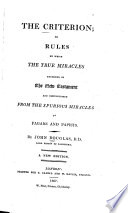 | David Hume - Economics - 1760 - 314 pages
...perfect, could not have inferred from the fluidity and tranfparency of water,- that it would fufibcate him, or from the light and warmth of fire, that it would confume him. No object ever difcovers, by the qualities which appear to the fenfes, either the caufes,... | |
 | John Douglas - Bible - 1807 - 432 pages
...could not have " inferred, from the fluidity and tranfpa-i " rency of water, that it would fuffocate " him, or from the light and warmth of " fire, that it would confume him. No " objeft ever difcovers, by the qualities " which appear to the fenfes, either the... | |
 | David Hume - 1817 - 528 pages
...its causes or effects, Adam, though his rational faculties be supposed, at the very first, entirely perfect, could not have inferred from the fluidity...discovers, by the qualities which appear to the senses, cither the causes which produced it, or the effects which will arise from it ; nor can our reason,... | |
 | David Hume - 1825 - 526 pages
...its causes or effects. Adam, though his rational faculties be supposed, at the very first, entirely perfect, could not have inferred from the fluidity and transparency of water, that it would sufibcate him; or from the light- and warmth of fire, that it would consume him. No object ever discovers,... | |
 | Methodist Church - 1854 - 652 pages
...of its causes or effects. Adam, though his rational faculties be supposed at the very first entirely perfect, could not have inferred from the fluidity...light and warmth of fire that it would consume him." All this we see no reason to dispute ; but when he advances to the conclusion that it is by repeated... | |
 | Charles Kittredge True - Logic - 1860 - 188 pages
...of its causes or effects. Adam, though his rational faculties be supposed at the very first entirely perfect, could not have inferred from the fluidity...light and warmth of fire that it would consume him." All this we see no reason to dispute ; but when he advances to the conclusion that it is by repeated... | |
 | Orestes Augustus Brownson - Christianity - 1874 - 588 pages
...very first, entirely perfect, could not, from the fluidity and transparency of water, have inferred that it would suffocate him ; or, from the light and...of fire, that it would consume him. No object ever reveals, by the qualities which appear to the senses, either the causes which produced it, or the effects... | |
 | George Henry Lewes - Knowledge, Theory of - 1875 - 500 pages
...knowledge of effects or causes is due to experience ; the other, the extremely irrelevant assertion that " no object ever discovers by the qualities which appear...produced it or the effects which will arise from it," — in other words, no object, viewed in its present condition, is viewed in its past and future* condition... | |
 | Immanuel Kant - Causation - 1881 - 614 pages
...impossible is it to find in any particular cause any particular quality by which it is the cause it is. ' No object ever discovers, by the qualities which appear...produced it, or the effects which will arise from it.' But if causality be not a quality, it can only be a relation. And this relation examined, we find all... | |
 | Orestes Augustus Brownson - Literature - 1882 - 564 pages
...very first, entirely perfect, could not, from the fluidity and transparency of water, have inferred that it would suffocate him; or, from the light and...of fire, that it would consume him. No object ever reveals, by the qualities which appear to the senses, either the causes which produced it, or the effects... | |
| |